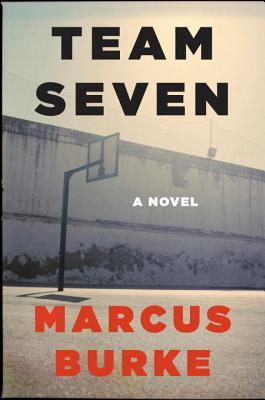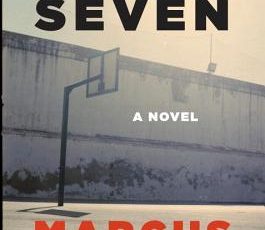This review was originally posted on Goodreads.com and reviews.wheelerc.org on March 5, 2014.
 Team Seven, while well-written, suffers from a lack of a coherent timeline and organization, lending significant doubt to its character’s actions, language, etc.
Team Seven, while well-written, suffers from a lack of a coherent timeline and organization, lending significant doubt to its character’s actions, language, etc.
Perhaps unfortunately for my opinion of the book, it came on the heels of the excellent novel “Astonish Me” by Maggie Shipstead, which has a similar structure and pacing. While Shipstead’s novel clearly placed time in which each chapter took place, “Team Seven” lacks any sort of grounding.
Admittedly, “Team Seven” is Burke’s first novel. For this, he deserves credit for a well-written novel.
Even so, “Team Seven” is not without its glaring errors.
The book starts off with the narrator and main character, Andre, discussing his father’s “vitals.”
“I would ask Pop about his strange-smelling funny-cigarettes but I’m afraid to ask him questions anymore. He’s always in a rush and never tells me where he’s going when he leaves.”
So, we’re made to understand, the narrator is a youngster. Yet, this problem remains through the entire narrative: there is only rarely, or never, indication of time and the character’s respective ages/grades in the context of the time.
Were one to presume the story takes place in a timeless place, between say the 1990s and the 2000s, the issue still strongly remains that the characters’ ages throughout the time-line are never given, casting doubt on their use of language and the plot.
The plot
Andre grows up in a not-incredible part of Boston, plays ball, gets involved in the marijuana trade and eventually leaves high school, presumably a graduate. Who knows. The book is not clear, of either Andre’s age, if he’s still in high school, or had graduated by the end.
Andre sort-of comes of age in a culture of violence and drugs. Andre, as one might guess, becomes a product of the society he grows up in, smoking more pot than any reasonable adult should, let alone a teenager. He drinks. He makes misogynistic comments about women and plays out those comments in his actions. He goes to church with his mother. He plays ball, and hustles at it. He strifes with his Jamaican-born father.
That is not to write, women are somehow saintly. No, everyone is steeped in violence and plays that violence out in their lives.
Almost everybody speaks in dialect, which it appears Burke has managed to keep up during the entirety of the book. (There is a strong danger, I believe, when writing in dialect, because one it is begun, it may not stop. Plus, it’s often hard to understand what’s being said.)
Although “Team Seven” is well written, and that decent writing carries much of the book, the plot is relatively thin.
The incongruities in voice
The narrator’s voice, which is what often gives hints of the age of the characters, jumps around. A seemingly little boy uses language to describe his surroundings more appropriate for a teenager, in terms of vulgarity and swearing.
I’m all for swearing. I work in a newsroom where swearing his the norm, although sometimes are foul language goes too far. I do not believe swearing is a sign, as some might argue, of weak writing. I believe a writer should use every tool available, from big words to swear words.
However, the amount of cursing in the narrator’s voice, that is to say, everything outside of dialogue, becomes tiresome and redundant. Further, it is often at odds (as mentioned mere paragraphs above) with the presumed age of the narrator.
Burke lays it on much too thick. We get it, man, we get it. It’s a nasty world out there.
Coming of what?
It’s certainly odd to have a coming of age story, coming of age from a pre-teen to that of a semi-adult, with no mention of where that person falls at any given point on the age scale. Or, where the other characters fall on that age scale.
Andre’s friends/fellow dealers, the main character’s, that is, are in high school. Some are out of high school. Maybe? The book is never clear on the true standing of most of the characters. Sloppy, sloppy, sloppy. A strong detraction that could have very easily been fixed, and should have.
From hypocrite, to . . . Hypocrite
Andre sleeps around a little bit, as do his friends, who have their own various mistresses. But he always comes back to Tunnetta, AKA, Chocolate Chip.
“He ripped pen his chocolate chip muffin (sic) and held it in the air like he was Rafiki from the Lion King holding Simba toward the sun.
‘The side of Tunnetta’s face, ladies and gentlemen!’ He spun himself around in a dramatic circle and curtseyed.
I never called her that but the nickname stuck, and bad skin, big tits, and pretty eyes was all Tunnetta ‘Chocolate Chip’ Johnson was known for around school. She wasn’t really a good look for me, but I was curious.”
So here we have the narrator, still with his “v-card,” presumably a freshman in high school, already having mastered the intricacies of the social order. He enjoys screwing Tunnetta, but thinks less of her for sleeping around. Despite his own sleeping around, but men should never confront society’s double standard of promiscuity, right?
Besides, this girl he’s screwing around with, when her boyfriend punches her in the face, it’s not his place to step in. That’s why he’s on his way to becoming a man.
Unfortunately, the incongruity between what the character’s say, AKA, no man ever hits a woman, and what they do, and allow others to do, is not addressed.
Multiple narrators, sort of
“Team Seven” starts out with multiple narrators. The Jamaican-born father and Andre’s mother, Ruby. But they each get maybe one to two of the 14 chapters. It’s not clear why they even narrate, mostly at the beginning of the book, if their voices never reappear.
It seems like the author started in one place, finished in another, and never cleaned up his book to reflect the beginning or the end.
Show, not tell
“Team Seven” is, fortunately, broken up, for the most part, into scenes. However, at the beginning of each chapter, there is usually a whole bunch of telling before whatever is going on in that scene begins. Which is annoying and, with the lack of viable age or other true clues to timeline, becomes confusing.
Take for example this little tid-bit. Notice the change from past to present tense. It’s not even clear when the narrator is speaking from. Is he speaking from a place in the future of the action he’s narrating if so, how far? Is he speaking in the present of his situation, or is he looking back mere days, speaking of the situation he is currently in, referencing the very-recent past? Who knows.
“When school lets out, the drama of the hallway turns real. You’ll get your issue if you got one. This is how it worked. Basically you had to be some type of somebody. We latchkey kids all walked together in a huddle, but won’t get it twisted, we were not together. The pack was like a prison yard, everyone had their territory. People step out they zone and it turns into a jungle.
The conclusion is summarily confusing, mixing the present tense with the recent past, the current event with recent similar past events (bible studying.)
The end
For a first novel, “Team Seven” is a good try with good writing that could have used lots and lots more grounding.
This book was received, free of charge, from the Goodreads First Reads program.
All quotes are taken from a bound galley version of the book and may, or may not, reflect the final commercial edition.
